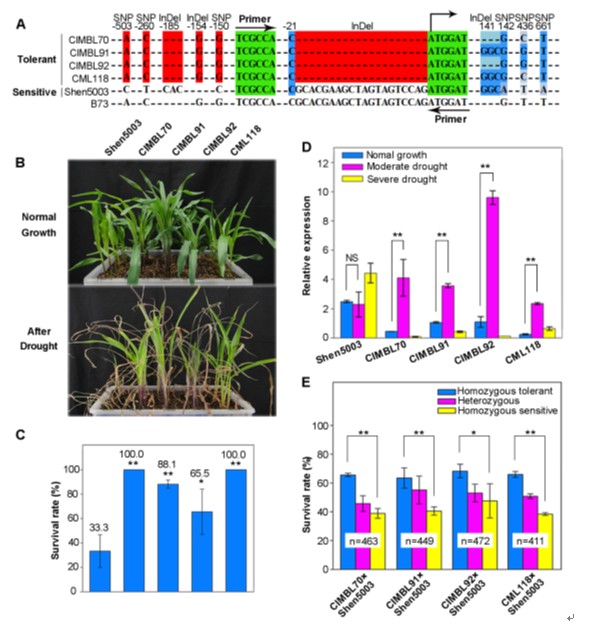Water scarcity is one of the most severe threats to maize production worldwide. Although research has demonstrated that DREB-type transcription factors play important roles in plant water stress response, whether the specific genetic variants in DREB genes contribute to plant drought tolerance is largely unknown. Taking advantages of recent technical and methodological advance, Dr. Feng Qin’s group systematically analyzed all the functional DREB genes in maize and examined their associations with the natural variation in drought tolerance of 368 maize varieties collected from tropical and temperate regions. A significant association in the ZmDREB2.7 gene with drought tolerance was detected that the DNA polymorphisms in the gene promoter region, but not those in the protein coding region, contributed to observed variations in maize drought tolerance, probably due to the distinct gene expression patterns in response to the stress. Overexpressing ZmDREB2.7 in Arabidopsis resulted in enhanced tolerance to drought stress. Moreover, a favorable ZmDREB2.7 allele, identified from drought-tolerant varieties, was effective in improving plant tolerance to drought stress when it was introduced into a drought-sensitive background. ZmDREB2.7 and its favorable allele represent a valuable genetic resource for enhancing maize drought tolerance by marker assisted breeding and transformation technology (Liu et al., 2013, PLoS Genet 9: e1003790. doi:10.1371) .

Figure 7. The favorable allele of ZmDREB2.7 improves maize drought tolerance
(A) Haplotypes of ZmDREB2.7 in CIMBL70, 91, 92, CML118, Shen5003 and B73 (as reference genome) maize genotypes.
(B) Phenotypic response of CIMBL70, 91, 92, CML118 and Shen5003 to drought stress.
(C) The survival rate of CIMBL70, 91, 92, CML118 and Shen5003 plants exposed to moderate and severe drought stress.
(D) Relative level of ZmDREB2.7 expression in CIMBL70, 91, 92, CML118 and Shen5003 grown under normal and drought stress conditions.
(E) The effect of the ZmDREB2.7 favorable allele on drought tolerance in four F2 segregating populations of maize.
Water scarcity is one of the most severe threats to maize production worldwide. Although research has demonstrated that DREB-type transcription factors play important roles in plant water stress response, whether the specific genetic variants in DREB genes contribute to plant drought tolerance is largely unknown. Taking advantages of recent technical and methodological advance, Dr. Feng Qin’s group systematically analyzed all the functional DREB genes in maize and examined their associations with the natural variation in drought tolerance of 368 maize varieties collected from tropical and temperate regions. A significant association in the ZmDREB2.7 gene with drought tolerance was detected that the DNA polymorphisms in the gene promoter region, but not those in the protein coding region, contributed to observed variations in maize drought tolerance, probably due to the distinct gene expression patterns in response to the stress. Overexpressing ZmDREB2.7 in Arabidopsis resulted in enhanced tolerance to drought stress. Moreover, a favorable ZmDREB2.7 allele, identified from drought-tolerant varieties, was effective in improving plant tolerance to drought stress when it was introduced into a drought-sensitive background. ZmDREB2.7 and its favorable allele represent a valuable genetic resource for enhancing maize drought tolerance by marker assisted breeding and transformation technology (Liu et al., 2013, PLoS Genet 9: e1003790. doi:10.1371) .

Figure 7. The favorable allele of ZmDREB2.7 improves maize drought tolerance
(A) Haplotypes of ZmDREB2.7 in CIMBL70, 91, 92, CML118, Shen5003 and B73 (as reference genome) maize genotypes.
(B) Phenotypic response of CIMBL70, 91, 92, CML118 and Shen5003 to drought stress.
(C) The survival rate of CIMBL70, 91, 92, CML118 and Shen5003 plants exposed to moderate and severe drought stress.
(D) Relative level of ZmDREB2.7 expression in CIMBL70, 91, 92, CML118 and Shen5003 grown under normal and drought stress conditions.
(E) The effect of the ZmDREB2.7 favorable allele on drought tolerance in four F2 segregating populations of maize.
